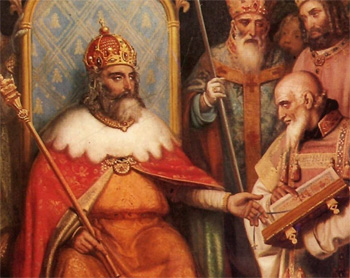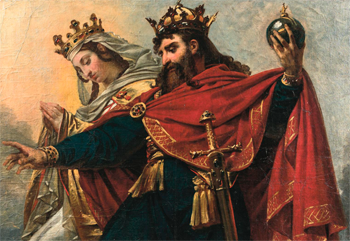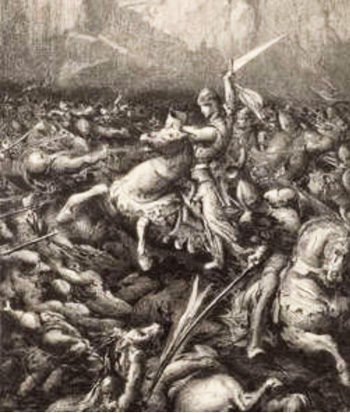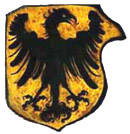Personalities
 |
 |
 |
 |
 |
 |
 |
The Carolingian Light - I
The Grandeur of Charlemagne’s Life
Einhard provides us with this description of Charlemagne:
"Charles was large and strong, and of lofty stature, though not disproportionately tall (seven feet tall). The head was round and well-formed, his eyes very large and animated, his nose a little long, his hair white, and his face jovial. Thus his appearance was always stately and dignified, whether he was standing or sitting. ... His gait was firm, his whole carriage manly, and his voice clear."
 This heroic figure was possessed of a joyful spirit. The Monk of St. Gall recounts that anyone who came before Charlemagne sad and disturbed would leave him serene, just by the effect of his presence and some few words. The virility and honesty of his nature strengthened all those who were associated with him. His majesty had neither a rigid arrogance nor a suspicious reserve; rather, the tranquil grandeur of his personality dominated everything around him, and, notwithstanding, was unpretentious and self-contained.
This heroic figure was possessed of a joyful spirit. The Monk of St. Gall recounts that anyone who came before Charlemagne sad and disturbed would leave him serene, just by the effect of his presence and some few words. The virility and honesty of his nature strengthened all those who were associated with him. His majesty had neither a rigid arrogance nor a suspicious reserve; rather, the tranquil grandeur of his personality dominated everything around him, and, notwithstanding, was unpretentious and self-contained.
The terrifying impression he caused in the hearts of his enemies as a warrior leading his army is described by the Monk of St. Gall:
"Then could be seen the iron Charles, with his head covered by a iron helmet, his hands clad in iron gauntlets, his iron breast and broad shoulders protected with an iron breastplate: an iron spear was raised on high in his left hand. His right always rested on his unconquered iron falchion. His thighs were clad with plates of iron. … His shield was all of iron.
"When he appeared, the inhabitants of Pavia cried out with fear: O, the Iron Man! O, the Iron Man!"
This Iron Man had a profoundly sensitive heart. Charlemagne wept like a boy at the death of a friend. The victor of a hundred battles showed a paternal care for the poor. The man whose steps caused all of Europe to tremble and in whose grand campaigns a million men were conquered was the most tender of fathers, who never could dine without the presence of one of his children.
It was his Religion that gave the noblest impulse to his strong and fecund spirit and that conferred glory to his power. And under its protection he placed the peoples that his sword had conquered
Comments by Prof. Plinio -
This magnificent portrayal of Charlemagne provides us occasion to make two commentaries of different natures. One is about Charlemagne in his life; another, more adventurous, is about Charlemagne after his death.
 About Charlemagne during his life: He was one of those masterpieces of Divine Providence.
About Charlemagne during his life: He was one of those masterpieces of Divine Providence.
Many times, God wants to celebrate His glory through men with powerful minds but fragile bodies; thus, by contrast he affirms the independence of the soul, showing that a great soul can animate a weak body.
At other times, God wants to celebrate His glory by giving a virtuous man an enormous body but a lesser soul, showing that even in a lesser soul what is important is the role of virtue. The smaller intelligence is blotted out by the grandeur of the virtue. This is what is said about St. Christopher, who had an enormous body but was very candid, very naïve. God made him a masterpiece of candor, of freshness of soul, of strength placed at the service of a charming naïveté.
In the case of Charlemagne, God wanted the perfection of everything. He wanted the reflection of His glory to be made not by contrast to Him, but by coherence with Him: A great intelligence animated a large body, which served to show the greatness of a soul that accomplished a great work, attained a great virtue and left a great memory. Grandeur is seen in all the aspects of his life. This is the note that characterizes Charlemagne.
In the time of war when mechanical and chemical elements of destruction were not present, the physical strength of the warrior was very important. Overall a well-armed warrior was fundamental. Charlemagne advanced into the middle of a battle more or less like a tank would move forward today. That is, he was heavily armored and very strong.
In the battle he would boldly enter the ranks of his enemies opening a wake after him, a furrow type of freeway after him, which allowed his men to follow him. We can imagine the beauty of Charlemagne in battle.
This description depicts him as a man with white hair - in the early days of his seniority - but still vigorous, with a powerful form covered with iron and ready to attack the adversary. He was the father of a people, assuming all the risks and going ahead to lead his men to victory. So, we can imagine the warriors of Pavia who saw that colossus appear before the walls of their city. We can hear them shouting - "O! The iron Man! O! The iron Man!" - and then moaning.
This means that he was not only covered with iron, but he instilled an iron courage in the warriors who were with him. When he was present, all became iron men. The army that followed the iron Emperor became an iron army. He terrified those who fought against him. Thus, he rode out to fight all those enemies of justice and, above all, those enemies of the Holy, Catholic, Apostolic and Roman Church.
 The battle ends, Charlemagne goes to his tent, takes off his armor, washes and seats himself at a table that is a rude plank of wood covered with a precious fabric and he orders wine to be served. The servants bring a goblet of gold inlaid with precious cabochons. He drinks in large gulps and then, in a thundering voice, he speaks of the deeds of the battle with his peers, glorifying Our Lady for the victory in the fight. Then, after those unpretentious words, the giant goes to sleep.
The battle ends, Charlemagne goes to his tent, takes off his armor, washes and seats himself at a table that is a rude plank of wood covered with a precious fabric and he orders wine to be served. The servants bring a goblet of gold inlaid with precious cabochons. He drinks in large gulps and then, in a thundering voice, he speaks of the deeds of the battle with his peers, glorifying Our Lady for the victory in the fight. Then, after those unpretentious words, the giant goes to sleep.
The repose of Charlemagne is communicative; it spreads serenity. Just as he spread serenity when he was awake, so also did he most probably spread serenity to the warriors who rested. How placid was the sleep of the Emperor! The warriors would sleep with the idea that, should an attack occur, this Iron Man would awake before all the others and lead them in the battle, protecting all of them. Even during his sleep he was the guardian angel of his people.
Morning comes and he wakes up. The day starts in the camp. Persons arrive at his tent to speak with him. He is accessible, amiable, calm; he assists them all, he transmits joy to all, he transmits goodness to all. He is the fount of satisfaction for all in the camp. In that camp he is at the same time a fortified tower and a fountain of living water. All approach him to drink a little of his presence.
I imagine a young warrior who could not approach him standing at a distance and simply gazing at him when the Emperor was not watching, just in order to observe a little closer how the Emperor was, to admire him and to be permeated by his presence and to assimilate the joy he communicated to all around him. He wanted to feel himself in some way a son of that great man who perhaps did not know him by name, but to whom the youth had the certainty of being linked by a special bond; to that man who was the joy of the entire camp and the entire Kingdom of the Franks.
Continued

"Charles was large and strong, and of lofty stature, though not disproportionately tall (seven feet tall). The head was round and well-formed, his eyes very large and animated, his nose a little long, his hair white, and his face jovial. Thus his appearance was always stately and dignified, whether he was standing or sitting. ... His gait was firm, his whole carriage manly, and his voice clear."

Emperor Charlemagne as described by Einhard
The terrifying impression he caused in the hearts of his enemies as a warrior leading his army is described by the Monk of St. Gall:
"Then could be seen the iron Charles, with his head covered by a iron helmet, his hands clad in iron gauntlets, his iron breast and broad shoulders protected with an iron breastplate: an iron spear was raised on high in his left hand. His right always rested on his unconquered iron falchion. His thighs were clad with plates of iron. … His shield was all of iron.
"When he appeared, the inhabitants of Pavia cried out with fear: O, the Iron Man! O, the Iron Man!"
This Iron Man had a profoundly sensitive heart. Charlemagne wept like a boy at the death of a friend. The victor of a hundred battles showed a paternal care for the poor. The man whose steps caused all of Europe to tremble and in whose grand campaigns a million men were conquered was the most tender of fathers, who never could dine without the presence of one of his children.
It was his Religion that gave the noblest impulse to his strong and fecund spirit and that conferred glory to his power. And under its protection he placed the peoples that his sword had conquered
Comments by Prof. Plinio -
This magnificent portrayal of Charlemagne provides us occasion to make two commentaries of different natures. One is about Charlemagne in his life; another, more adventurous, is about Charlemagne after his death.

Charlemagne, light of Europe & Civilization
Many times, God wants to celebrate His glory through men with powerful minds but fragile bodies; thus, by contrast he affirms the independence of the soul, showing that a great soul can animate a weak body.
At other times, God wants to celebrate His glory by giving a virtuous man an enormous body but a lesser soul, showing that even in a lesser soul what is important is the role of virtue. The smaller intelligence is blotted out by the grandeur of the virtue. This is what is said about St. Christopher, who had an enormous body but was very candid, very naïve. God made him a masterpiece of candor, of freshness of soul, of strength placed at the service of a charming naïveté.
In the case of Charlemagne, God wanted the perfection of everything. He wanted the reflection of His glory to be made not by contrast to Him, but by coherence with Him: A great intelligence animated a large body, which served to show the greatness of a soul that accomplished a great work, attained a great virtue and left a great memory. Grandeur is seen in all the aspects of his life. This is the note that characterizes Charlemagne.
In the time of war when mechanical and chemical elements of destruction were not present, the physical strength of the warrior was very important. Overall a well-armed warrior was fundamental. Charlemagne advanced into the middle of a battle more or less like a tank would move forward today. That is, he was heavily armored and very strong.
In the battle he would boldly enter the ranks of his enemies opening a wake after him, a furrow type of freeway after him, which allowed his men to follow him. We can imagine the beauty of Charlemagne in battle.
This description depicts him as a man with white hair - in the early days of his seniority - but still vigorous, with a powerful form covered with iron and ready to attack the adversary. He was the father of a people, assuming all the risks and going ahead to lead his men to victory. So, we can imagine the warriors of Pavia who saw that colossus appear before the walls of their city. We can hear them shouting - "O! The iron Man! O! The iron Man!" - and then moaning.
This means that he was not only covered with iron, but he instilled an iron courage in the warriors who were with him. When he was present, all became iron men. The army that followed the iron Emperor became an iron army. He terrified those who fought against him. Thus, he rode out to fight all those enemies of justice and, above all, those enemies of the Holy, Catholic, Apostolic and Roman Church.

An emperor both fierce & regal
The repose of Charlemagne is communicative; it spreads serenity. Just as he spread serenity when he was awake, so also did he most probably spread serenity to the warriors who rested. How placid was the sleep of the Emperor! The warriors would sleep with the idea that, should an attack occur, this Iron Man would awake before all the others and lead them in the battle, protecting all of them. Even during his sleep he was the guardian angel of his people.
Morning comes and he wakes up. The day starts in the camp. Persons arrive at his tent to speak with him. He is accessible, amiable, calm; he assists them all, he transmits joy to all, he transmits goodness to all. He is the fount of satisfaction for all in the camp. In that camp he is at the same time a fortified tower and a fountain of living water. All approach him to drink a little of his presence.
I imagine a young warrior who could not approach him standing at a distance and simply gazing at him when the Emperor was not watching, just in order to observe a little closer how the Emperor was, to admire him and to be permeated by his presence and to assimilate the joy he communicated to all around him. He wanted to feel himself in some way a son of that great man who perhaps did not know him by name, but to whom the youth had the certainty of being linked by a special bond; to that man who was the joy of the entire camp and the entire Kingdom of the Franks.
Continued

Posted April 26, 2023

______________________
______________________





